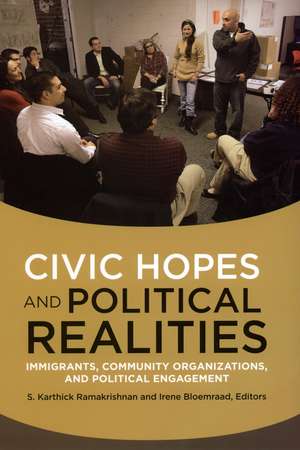Civic Hopes and Political Realities: Immigrants, Community Organizations, and Political Engagement
Editat de S. Karthick Ramakrishnan, Irene Bloemraaden Limba Engleză Paperback – 31 ian 2011
For many Americans, participation in community organizations lays the groundwork for future political engagement. But how does this traditional model of civic life relate to the experiences of today's immigrants? Do community organizations help immigrants gain political influence in their neighborhoods and cities? In Civic Hopes and Political Realities, experts from a wide range of disciplines explore the way civic groups across the country and around the world are shaping immigrants' quest for political effectiveness. Civic Hopes and Political Realities shows that while immigrant organizations play an important role in the lives of members, their impact is often compromised by political marginalization and a severe lack of resources. S. Karthick Ramakrishnan and Irene Bloemraad examine community organizations in six cities in California and find that even in areas with high rates of immigrant organizing, policymakers remain unaware of local ethnic organizations. Looking at new immigrant destinations, Kristi Andersen finds that community organizations often serve as the primary vehicle for political incorporation—a role once played by the major political parties. Floris Vermeulen and Maria Berger show how policies in two European cities lead to very different outcomes for ethnic organizations. Amsterdam's more welcoming multicultural policies help immigrant community groups attain a level of political clout that similar organizations in Berlin lack. Janelle Wong, Kathy Rim, and Haven Perez report on a study of Latino and Asian American evangelical churches. While the church shapes members' political views on issues such as abortion and same-sex marriage, church members may also question the evangelical movement's position on such issues as civil rights and immigration. Els de Graauw finds that many non-profit organizations without explicitly political agendas nonetheless play a crucial role in advancing the political interests of their immigrant members. Recent cuts in funding for such organizations, she argues, block not only the provision of key social services, but also an important avenue for political voice. Looking at community organizing in a suburban community, Sofya Aptekar finds that even when immigrant organizations have considerable resources and highly educated members, they tend to be excluded from town politics. Some observers worry that America's increasing diversity is detrimental to civic life and political engagement. Civic Hopes and Political Realities boldly advances an alternative understanding of the ways in which immigrants are enriching America's civic and political realms—even in the face of often challenging circumstances.
Preț: 274.07 lei
Nou
Puncte Express: 411
Preț estimativ în valută:
52.44€ • 54.76$ • 43.31£
52.44€ • 54.76$ • 43.31£
Carte indisponibilă temporar
Doresc să fiu notificat când acest titlu va fi disponibil:
Se trimite...
Preluare comenzi: 021 569.72.76
Specificații
ISBN-13: 9780871547781
ISBN-10: 0871547783
Pagini: 408
Dimensiuni: 152 x 229 x 30 mm
Greutate: 0.59 kg
Editura: Russell Sage Foundation
Colecția Russell Sage Foundation
ISBN-10: 0871547783
Pagini: 408
Dimensiuni: 152 x 229 x 30 mm
Greutate: 0.59 kg
Editura: Russell Sage Foundation
Colecția Russell Sage Foundation
Notă biografică
S. KARTHICK RAMAKRISHNAN is associate professor of political science at the University of California, Riverside. IRENE BLOEMRAAD is assistant professor of sociology at the University of California, Berkeley. CONTRIBUTORS: Kristi Andersen, Sofya Aptekar, Maria Berger, Irene Bloemraad, Caroline B. Brettell, Els de Graauw, Shannon Gleeson, Rebecca Hamlin, Rahsaan Maxwell, Haven Perez, S. Karthick Ramakrishnan, Deborah Reed-Danahay, Kathy Rim, Laurencio Sanguino, Floris Vermeulen, Celia Viramontes, and Janelle Wong.
Cuprins
Table of Contents Chapter 1 ¿ Introduction (Karthick Ramakrishnan and Irene Bloemraad)1 PART I: THE IMPORTANCE OF PLACE Chapter 2 ¿ Making Organizations Count: The Importance of Place in Explaining the Incidence and Political Presence of Organizations (Karthick Ramakrishnan and Irene Bloemraad)59 Chapter 3 ¿ Parties, Organizations, and the Political Incorporation of Immigrants in Six Cities (Kristi Andersen)106 Chapter 4 ¿ Organizing for Latino Immigrant Labor Rights in two U.S. Cities: The Case of San Jose and Houston (Shannon Gleeson)148 Chapter 5 ¿ Inclusion versus Exclusion: Organizational Dynamics among Caribbeans in Britain and France (Rahsaan Maxwell)189 Chapter 6 ¿ Turkish Civic Networks and Political Behavior in Amsterdam and Berlin (Floris Vermeulen and Maria Berger)227 PART II: VARIATIONS ACROSS ETHNIC GROUPS Chapter 7 ¿ ¿Communities of Practice¿ for Civic and Political Engagement: A Comparison of Asian Indian and Vietnamese Immigrant Organizations in a Southwestern Metropolis (Caroline B. Brettell and Deborah Reed-Danahay)275 Chapter 8 ¿ High-Skilled but Unwelcome in Politics: Immigrant Political Incorporation in a New Jersey Suburb (Sofya Aptekar)317 Chapter 9 ¿ Selective Service: Civic Engagement among Indian, Polish, and Mexican Immigrants in Chicago (Laurencio Sanguino)347 PART III: VARIATIONS BY ORGANIZATION TYPE Chapter 10 ¿ Latino and Asian American Protestant Churches and Conservative Politics in the United States (Janelle Wong, Kathy Rim, and Haven Perez)382 Chapter 11 ¿ Immigrants At Work: How Labor Unions Build Political Power for Non-Citizen Members (Rebecca Hamlin)422 Chapter 12 ¿ The Role of Nonprofit Organizations in Structuring Immigrant Political Incorporation in Urban America (Els de Graauw)460 Chapter 13 ¿ Civic Engagement Across Borders: The Promise and Challenge of Mexican Immigrant Hometown Associations in Southern California (Celia Viramontes)
